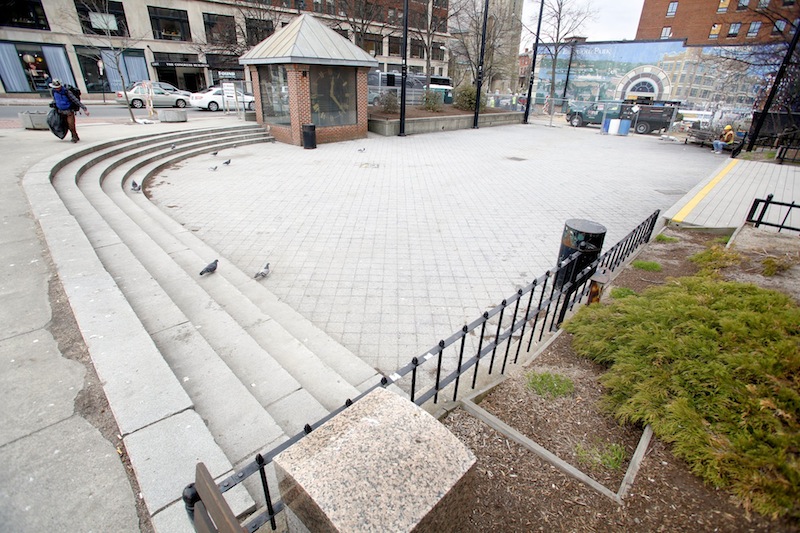PORTLAND — Portland’s attorney has rejected a petition effort to block the city from selling Congress Square Plaza.
“The citizen initiative process cannot be used with respect to the proposed sale of Congress Square” because it conflicts with the city charter and state law, said a written announcement issued by the city Friday.
The rejection immediately led to criticism that the city is ignoring the will of citizens.
“The city leaders continue with what’s been a wholly undemocratic process as they move forward with plans to sell our neighborhood park. I’m disgusted,” said John Eder, co-founder of the Friends of Congress Square Park.
The City Council is expected to decide Monday whether to sell most of Congress Square Plaza to Ohio-based Rockbridge Capital, the developer that is renovating the former Eastland Park Hotel.
Rockbridge Capital has offered to pay the city $524,000 for two-thirds of the nearly half-acre plaza so it can add an event center and art gallery to the hotel, leaving room for the city to create a smaller plaza at the intersection of Congress, High and Free streets.
Supporters of the sale, including some in the business community, say the underused public square has become an eyesore and should be redeveloped. Critics say the city should keep and revitalize the plaza for its residents, not make a deal with an out-of-state developer.
The dispute has spawned protests and dueling campaigns on social media. The council held a three-hour-plus public hearing Monday that had to be interrupted multiple times so order could be restored.
City councilors are closely divided on the sale, and opponents have been preparing for a possible referendum drive to overturn a “yes” vote.
The Friends of Congress Square Park submitted affidavits on Sept. 6 as a first step toward a petition drive and a citywide vote that might block the sale if councilors don’t reject it.
Members of the group intended to start collecting signatures as soon as the city’s attorney validated the proposal as legal.
The group’s proposal would put Congress Square Plaza and dozens of other properties in the city’s Land Bank. The sale or lease of any of those properties would require approval from the Land Bank Commission and eight of the nine votes from the City Council, or six votes accompanied by a citywide vote.
After a week-long review of the proposal, the city’s lead attorney, Danielle West-Chuhta, determined that it conflicts with Maine law and city code, the city said Friday.
“Portland City Code specifically states that citizen initiatives can only apply to legislative matters and cannot affect administrative matters including city appropriations, which has been defined in some contexts to include the sale of city-owned property,” said the city’s announcement.
While a citizen petition can be used to change city policy — such as legalizing marijuana, for example — it cannot be used to make or overturn financial decisions that affect management of city government, said Nicole Clegg, Portland’s spokeswoman.
“This was not easy. This was something that a lot of thought was put into,” Clegg said. “We respect the citizen initiative process. We see a lot of value in citizen initiatives. There are functions of a citywide vote and functions of the City Council, and this fell within the functions of the City Council.”
The attorney representing the Friends of Congress Square Park said Friday that the group may sue the city over the rejection. Members will meet Sunday night to decide whether to take legal action, Robert Levin said.
“What they’re saying is that the people can’t be trusted with this kind of decision, and I just think that’s wrong on policy and wrong on legal merit,” Levin said. “I think it’s very ironic that they say the people can’t be trusted to protect the parks, considering the council is trying to sell part of a park.”
Levin said the group has already been talking to litigators with an eye to hiring a specialist to argue its case.
City Councilor David Marshall, who has opposed the sale, said the city attorney’s position is “a different interpretation” of the charter than he has seen in the past.
“This is a very broad interpretation of the charter, I would say,” said Marshall, noting that he’s not an attorney. “Regardless, I think we’ve seen recent polling that shows there’s a lot of opposition to the sale of the square. It makes a lot of sense for the council to vote against it.”
Assistant City Editor John Richardson and Staff Writer Noel K. Gallagher contributed to this report.
Send questions/comments to the editors.


